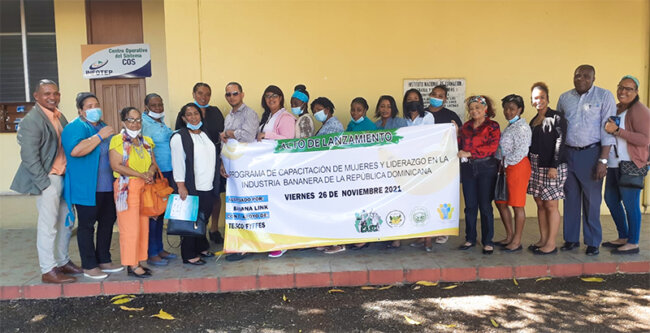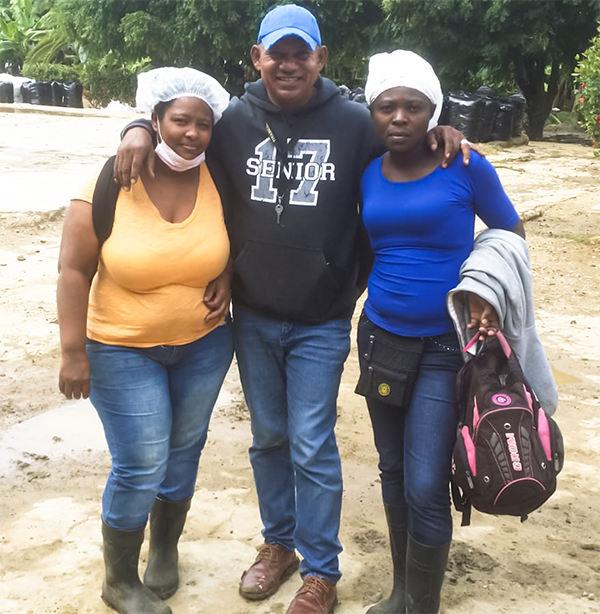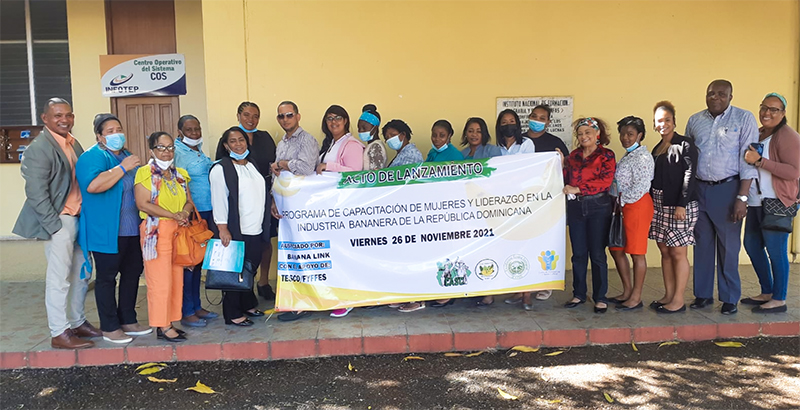Banana Link is coordinating a women’s empowerment and leadership training project in the Dominican Republic, which was launched in late November 2021, writes Banana Link Project Officer, Holly Woodward-Davey.
The project will see a core group of 10 women workers and small farmers – from across the three main banana exporting provinces of the country – receive intensive leadership and empowerment training across a broad range of topics encompassing non- violence and harassment, Dominican labour law, certification policy and international standards, personal finances and digital literacy and communication skills. Once this first phase is completed, the training will be rolled out to a much larger group of women on Dominican farms and plantations using a ‘training the trainers’ methodology.
The initiative, with the financial support of Tesco and Fyffes, is designed to include a diverse group of women who represent the reality of Dominican banana production. This includes women owners of small banana farms and plantation workers from across the country, women of both Dominican and Haitian origin, women of different ages and workers from a range of different plantations across the nation.
The training is led by Dominican development expert and women’s rights advocate, Dra. Eliza Sanchez, in collaboration with Banana Link’s partners in the country: SIUTRAPBAM – the banana workers union of Montecristi, development organisation Fundación Étnica Integral (FEI) and migrant focused NGO the Cultural Research and Support Centre (CIAC).

The launch was attended by the core group of women participating in the leadership and empowerment training initiative. Local partners, Dominican banana business leaders and government representatives addressed the group
Why do women in the Dominican banana sector need empowering?
In line with global trends, the proportion of women employed in the Dominican banana sector is very low, and women are generally limited to employment in pack-houses or in service-related tasks on farms.
Research conducted by Banana Link in 2015 found that the proportion of women employed in the banana industry is around 12% for plantation workers, and that the proportion of small banana farms owned by women is about the same. The same study found that while all the female farm heads interviewed were members of farmers’ associations, only 4 out of 101 held leadership positions, indicating a broader pattern of absence of women in leadership positions in producer organisations.
Violence against women remains a major problem in the Dominican Republic, where in 2018, 68.8% of women aged 15 years and older were found to have experienced some form of violence in their lifetime, and the prevalence of violence against women was even higher in rural areas. Recent reports indicate that violence and harassment are present in 21 percent of Dominican workplaces.
As in other parts of the world, banana-producing areas in the Dominican Republic offer very few alternative sources of employment. With a high prevalence of women-headed households relying on female income to cover living costs, there is a need to ensure that women in banana-producing regions are not excluded from the main source of employment available to them. It is essential that rural women have decent and accessible employment
An optimistic future for Dominican banana workers
The initiative is designed to generate lessons on strategies and practices that can be deployed over the long term to empower rural women in banana exporting areas and increase their participation in the leadership of workers’ and producers’ organisations. The materials and methodologies developed will serve as a basis for future work to consolidate the role of women in creating decent work and maturing social dialogue in the industry.
It comes at an optimistic time for the Dominican banana industry. The long-standing problems over the non-regularisation of Haitian workers is being tackled by a recently formed national Roundtable: A coalition of Fairtrade, trade unions, banana producers and civil society groups has devised a ‘roadmap’ which will enable migrant workers in Fairtrade certified organisations to obtain legal status and access the same rights enjoyed by their Dominican colleagues. Tackling this issue and ensuring compliance with Fairtrade standards is crucial, considering that 60-70% of Dominican bananas are certified Fairtrade, with all the benefits this brings for workers and their communities.
The political situation of the Caribbean nation is also looking hopeful for workers. President Luis Abinader, elected in 2020, has made some firm commitments to improving the conditions of working people – including the announcement of an average salary rise of 24% in 2021 and public recognition of the importance of trade union freedom and collective bargaining on Labour Day last year.
And for banana workers in particular, the recent affiliation of SIUTRAPBAM to the Latin American Coordinating Body of Banana and Agro-industrial Unions, COLSIBA, brings them into the fold of an organisation that has worked for almost 30 years on labour rights in the banana industry, and all the benefits that this brings. The icing on the cake for women workers is the recent election of Colombian women’s rights advocate and experienced trade unionist Adela Torres as COLSIBA Coordinator for the next two years. There is no doubt that her commitment to gender equity in the banana industry will ensure gender takes a central role in the work of the union coordinating body over the next two years.
 Evelin Cabrera and Joseline Meme, members of the training programme’s core group, meet with Crusito Torres of SIUTRAPBAM
Evelin Cabrera and Joseline Meme, members of the training programme’s core group, meet with Crusito Torres of SIUTRAPBAM
Holly Woodward-Davey
Banana Link
Project Officer
Photos: SIUTRAPBAM
